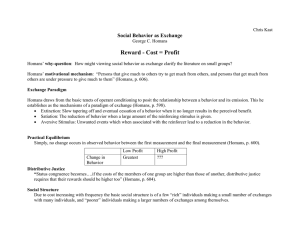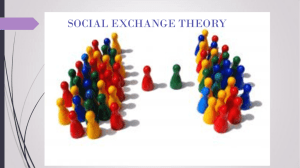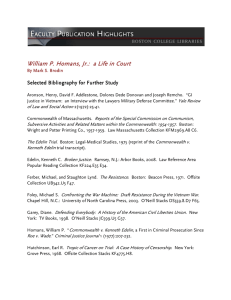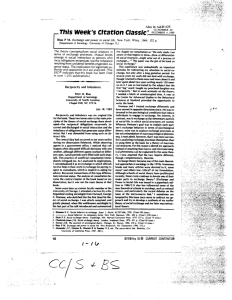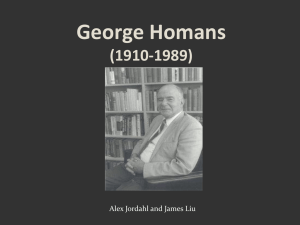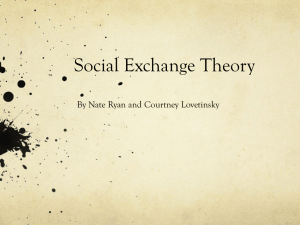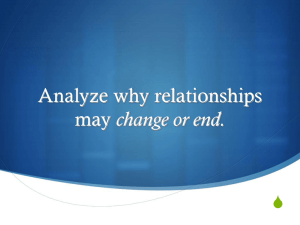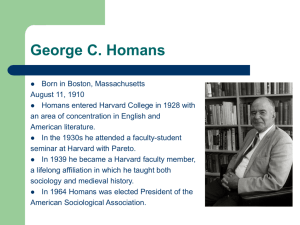Document 11257896
advertisement
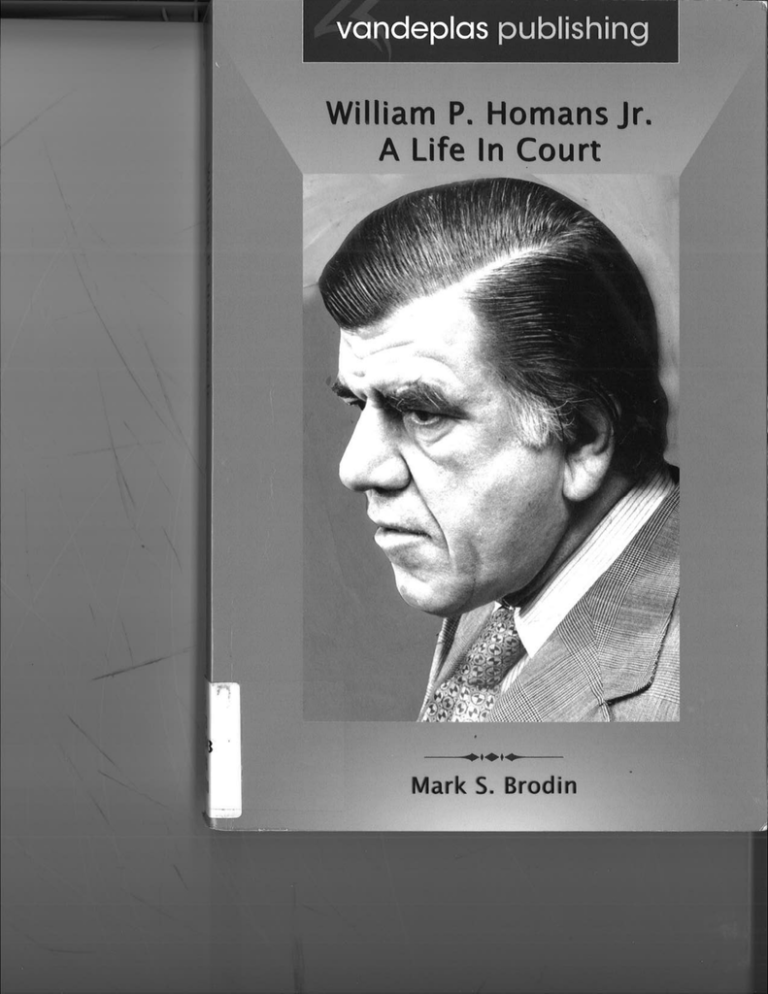
BOSTON COLLEGE LAl/l/ LIBRARY
WiUiam P, Homans Ir.:
A Lfe In Court
Mark
;i{-.;a:t.
¿-:i{
.
S. Brodin
iÌ.' ,..
:
Vande'plas Publishing
United States of Atnerica
Table of Contents
tx
Prologue
Chapter 1 AusPicious Beginnings
Chapter 2 The War Years
Chapter
3
Finding a Place in the Profession
L9
Chapter
4
Civil Libertarian
4L
Chapter
5 For the Defense
6L
Chapter 6 The Vietnam Years
LO7
Chapter 7 The Trial of Dr. Edelin
155
Chapter B Battling the Death Penalty to the Death
209
Chapter
9 Modernizing
the Insanity Defense
229
Chapter 10 The Strange Disappearance of Malik Hakim
243
Epilogue
257
A Note on Sources
263
Interviews..
263
Bi bli
ographi
ca I
Sources
264
End Notes
267
vlt
Prologue
A criminal lawyer of great geníus. A civil
libertarian. A hero and role model for a
generation of lawyers. An advocate committed to
his cliencs and their causes. Yet a man unable or
unwillíng to insist his clíents pay him. A man
unable to manage the business aspects of his
profession or his personal affairs. This was the
enigmatic giant of Massachusetts legal Iore.r
William P. Homans fr., descended from two of Boston's most storied
families that together had produced generations of illustrious surgeons,
distinguished Harvard faculty, prosperous corporate lawyers and
prominent politicians, spent most of his professional life in Boston's
grimy criminal courts defending society's cast-offs, w¡th little or no
recompense. Raised on a gentleman's [arm, this courtly patrician became
unlikely guru to Boston's progressive legal community and role model for
the generation of activist lawyers that came of age in the 1960s. World
War II combat veteran of both the British and American navies, Bill
Homans was also first-responder of choice for anti-Vietnam War
demonstrators who would write his phone number on their hands,
knowing they could call him for legal assistance day or night. Hardened
inmates at the state's maximum-security prison enjoyed the company of
this lifelong member of Harvard's ultra-exclusive Phoenix Club when he
joined them as an "observer" during the tumultuous guards' strike of
7973.
Bill Homans' story is one deeply rooted in the New England tradition
of social activism, from anti-slavery leaders William Lloyd Garrison and
Wendell Phillips, to N.A.A,C.P. f,ounders Moorfield Storey and W.E.B,
DuBois, to his own Aunt Mary Peabody, arrested at age sevenly-three
while leading a civil rights protest in the South. Homans was, as the
Boston Globe profiled him, "that kind of quirky maverick that the harsh
soil of New England has nurtured since it bore abolitionists and
transcen de nta lis ts."
-
I
Edgar J, Bellefontaine's Appreciation ol William P. Homans lr., Massachusetts
Lawyers Weekly,lune 1.6, 1.997.
William
e
P. Homans Jr,:
A Lite in Court
But it is also the tale of one man's instinctive capacity to empathize
with persons who had traveled quite different paths than his, and to
champion their causes as his own. The imperfections and weaknesses in
his clients seemed to resonate loudly in his own being, perhaps because
he saw small parts of himself reflected in them. It was the human
condition, and not any all-consuming political ideology, that motivated
Bill Homa ns' work.
He was, in the words of a prominent member of the Boston Bar, a
"bona y'de cultural hero who gets more applications from law students
who want to work for him than anyone this side of Ralph Nader.,,2
Homans was a one-of-a-kind, neither the clichéd noblesse oblige dogooder nor a "movement lawyer" like william Kunstler, counsel in the
infamous chicago seven trial,3 who would pal around with his radical
clients and revel in the role of featured speaker at rallies. while he
represented sDS weathermen and Black panthers,a william p. Homans
Jr.
always remained william P. Homans Jr,-we[-bred, from good yankee
stock, of Harvard, Hasty Pudding Institute, and Homans Lane. He was, as
fellow trial lawyer Harvey silverglate observed, far more respectable
than he was radical,s when left-liberal lawyers unofficially split into old
and New Left factions in the 1960s, Homans stood aside, revered by both.
In the backdrop of this story is the historic rivalry between the
Boston Irish political class and the Brahmin elites (the term coined by
oliver wendell Holmes sr.), between the Roman catholic immigrant
newcomers and the Anglo-Protestant Mayflower set-- a perennial contest
for turf and power and cultural predominance that has so indelibly
shaped Boston's history, and is mimicked in its legal profession. The
"white shoe" corporate firms were, until relativery recently, an enclave
reserved for Harvard-educated upper-crust wASps, with ethnics
relegated to small or solo trial practices or prosecutors' offices.
Homans, destined for a prosperous career handling the affairs of his
fellow Yankees, declined his birthright and chose instead to devote
himself to "the least of these." A lapsed Brahmin, he straddled the class
divide while ushering his clients through as well, navigating eflortlessly
between the sedate Boston eating clubs and the back-slapping State
House crowd [where he served a term in the legislatureJ, the Brattle
Street intelligentsia and the courthouse regulars feverishly chasing
their
Prologue
ern|athize
and to
esses in
because
human
dvated
Bar,
a
dents
gr,"2
doin the
dical
he
s
Jr.
ee
as
ble
Id
xi
and famous yachting off of Martha's Vineyard and the
next case, the rich
grim lock-up at the Charles Street Jail'
Bill Homans stands in the line of great lawyers who, as Oliver Wendell
fr, put it, were willing to immerse themselves in the agonies of
their times. The list includes both familiar and long-forgotten names.
philadelphia lawyer Andrew G. Hamilton came to the assistance of New
york newspaper publisher John Peter Zenger, accused in 7735 of
seditious libel for criticizing the Royal Governor. Following the chilling
disbarment of the lawyers who initially appeared on behalf of Zenger,
Hamilton stepped forward and successfully defended him at trial. In the
Holmes
process, he dramatically advanced both the cause of a free press and the
right of a jury to nullify an unjust law.
James Otis openly challenged Royal authority
in a fiery
five-hour
oration denouncing the despised Writs of Assistance, the open-ended
licenses granted customs officials to search colonists anywhere and at
anytime. He did this before the very judges appointed by the King in
whose name the writs were issued. The Fourth Amendment right against
unreasonable searches and seizures is Otis' direct descendant.
John Adams, believing deeply thal every accused is entitled to a
vigorous defense, withstood scathing public disapproval and threats to
his own safety and livelihood to defend the British soldiers who killed
five protesters in the "Boston Massacre" of 1.770. The jury acquitted the
captain and all but two of his men. In the middle of the next century,
Salmon P. Chase and Roger S. Baldwin were defending runaway slaves
and those who aided them, challenging the "Peculiar Institution" decades
before the Civil War. Chase came to be known as "The Attorney-General
of Fugitive Slaves."
The most famous of this assemblage left a lucrative practice as a
railroad lawyer to represent the great socialist figure Eugene V. Debs and
his American Railway Union in the pivotal Pullman Strike of 1,894.
Clarence Darrow would etch the icon of "people's lawyer" into the
American psyche, and his representation of fohn Scopes, the Tennessee
high schoolbiology teacher prosecuted for teaching evolution in the 1925
"Monkey Trial," presaged the culture wars of our times. His impassioned
summation in the "thrill murder" trial of teenagers Nathan Leopold and
xl
William p. Homans
Jr.: A Lile in Court
Richard Loeb enthrailed the nation and changed
the way many thought
about capital punishment,
Described as a "crarence Darrow-rike defender
of poor and brack
peopre" by progressive historian Howard
zinn,6 Homans demurred to
such comparisons with characteristic modesty-he once told an
interviewer that he was no crarence Darrow,
but conceded that peopre
did "gravitate to me."7 Like Darrow, whom he greatly
admired, there was
no client, case, or cause too unpopurar to scare
him off. Homans
understood ail too well what Darrow meant
when he spoke of ,,standing
in the lean and lonery front line facing the greatest
enemy that ever
confronted man- public opinion.,,s
From the war Against Fascism in the 1940s
to the poriticar witch
hunts of the 1950s to the civir rights and
anti-war struggres of the 1960s
and 1970s, Homans stood center stage.
Innumerable persons facing the
bleak prospect of imprisonment or worse
are forever in his debt. And his
lifelong campaign against capitar punishment
remains, like Darrow,s, his
most rasting regacy. while the Brahmin caste
arways thought oi
themselves as "the undisputed arbiters
of the pubric good,,,o Biil Hãmans
truly lived that reality.
That he achieved what he did in spite of
the personar demons he
fought everyday, and which visited so much
anguish on famiry, friends,
and associates, testifies to his indomitabre spirit
and unrerenting
devotion to the principles he espoused. His
was not an easy road. He
suffered deep bouts of depression, abused
arcohor, smoked incessantry,
and egregiously mismanaged his finances.
Handling so many cases at his
frenetic pace compromised his mentar
and physicar hearth, distanced him
from his chirdren, and red to the disintegration
of his second marriage.
But, ironicaily, it was arso his work that
sustained Biil Homans in his
bleakest moments, and it is the rife he rived
in court that is the centrar
focus of this volume.
It can be said of Homans that his crients benefited
far more from his
work than he ever did personally. They had
the brilliant and committed
professional on their side. Famiry
and friends often experienced a
different, darker person. The mystery is
how he could be so focused, so
confident, so together in court, when
he was so troubred, so torn,
sometimes so distraught, outside
that venue.t0
Prologue
to
rn
le
xiii
Biography should serve not just as a lens to observe the subject's
dmes, but to illuminate our own as well. Frederick Douglass often
remarked that freedom is a constant struggle, and Bill Homans' career
has an all too obvious resonance to us. Whether it's the right to
vigorously resist an immoral war, or the f,ight to preserve our privacy
against increasingly sophisticated government intrusion, or the daily
endeavor to constrain the vengeful forces in our criminal justice system,
or the protection of reproductive choices of women and their doctors--
truly his causes are today's causes'
A personal note
Some years ago when I was casting about for a new scholarly
direction, I fastened on the idea of a biography. The first name that came
to mind was Bill Homans, whom I had known fbut not well) years before
when I was in practice as a civil rights lawyer. But why him?
Over the time that I have worked on this book, that question has been
answered hundreds of times over. William P. Homans Jr. radiated a
nobility of purpose that absolutely captivated everyone he touched. His
coterie of protégés stretches across time and space- people for whom
he remains, so many years after his passing in 7997, the inspiration for
their work,
Psychologists tell us that nothing just randomly "pops into our
minds." Bill Homans, as the pages that follow attest, has more than
earned his place in our collective memories.
Mark S. Brodin
Newton, Massachusetts
September,2OOg
